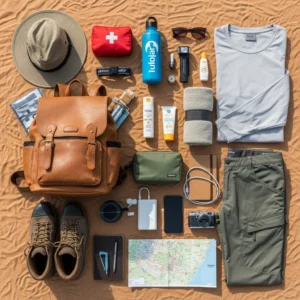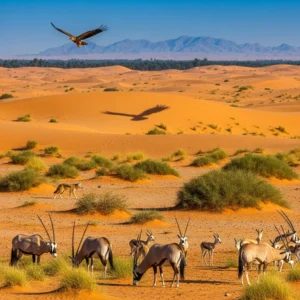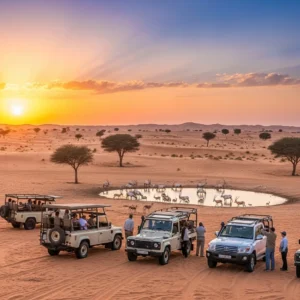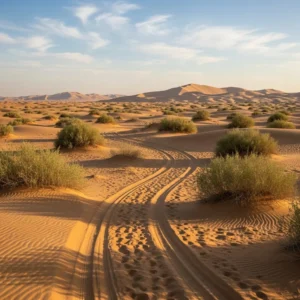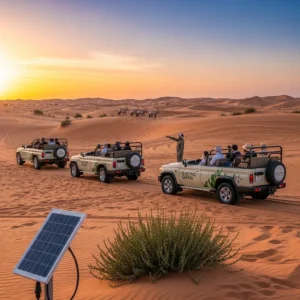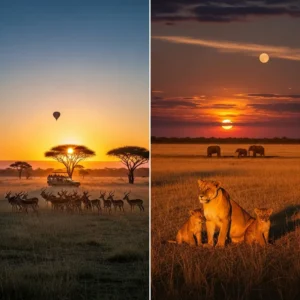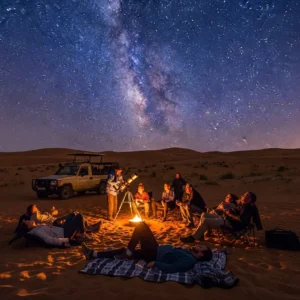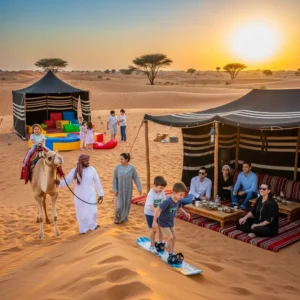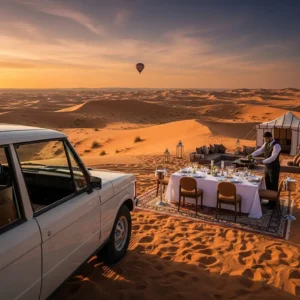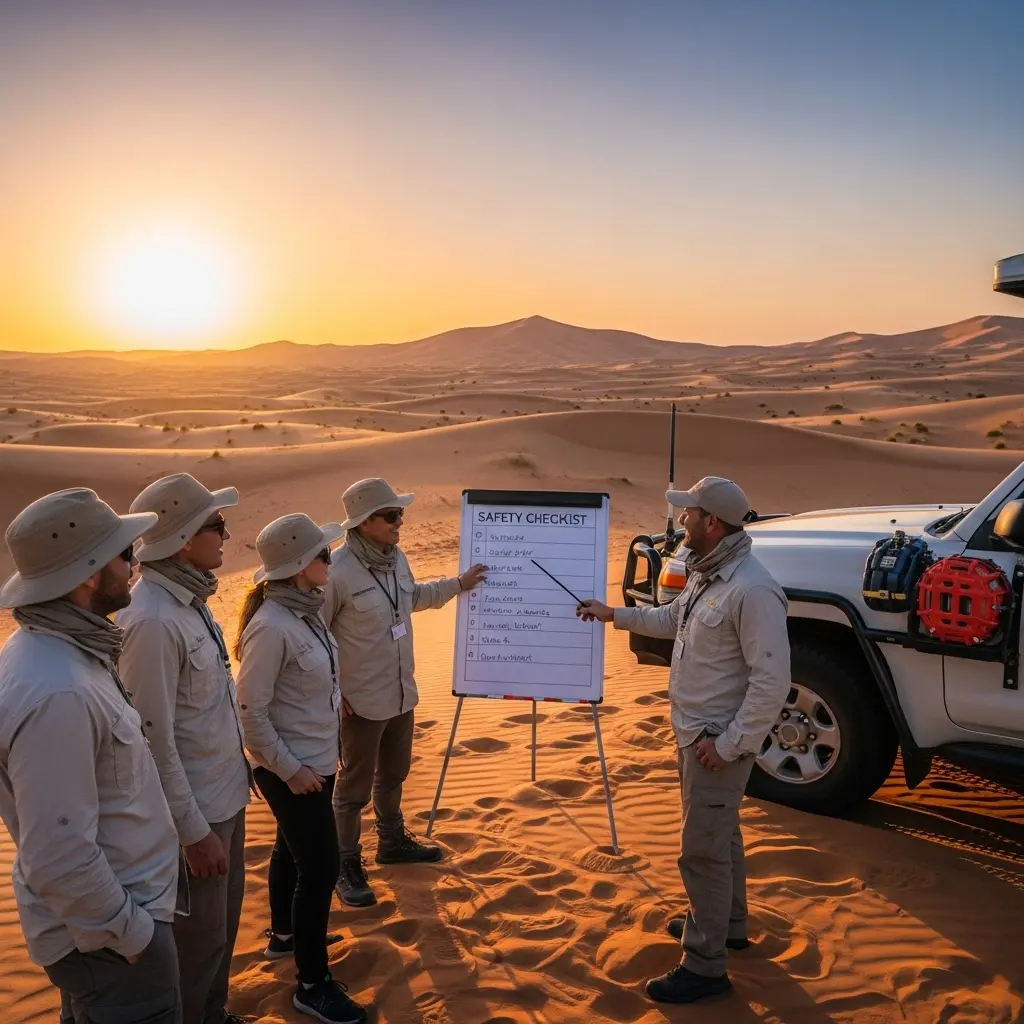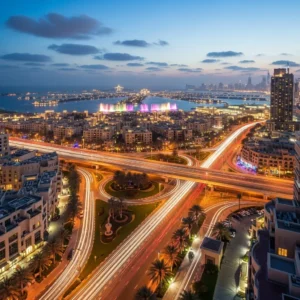A First-Timer’s Guide to Desert Safari Safety: 15 Essential Tips
A desert safari in Dubai is a bucket-list adventure, a thrilling blend of high-speed excitement, rich cultural immersion, and the serene beauty of the Arabian landscape. For a first-time traveler, the anticipation is immense. But alongside the excitement, it’s natural to have questions about safety. Is dune bashing safe? What are the camps like? How should I prepare?
Let’s put your mind at ease. A professionally operated desert safari is an extremely safe and well-managed experience, designed to provide thrills in a highly controlled environment. The key to a worry-free adventure lies in making informed choices and being prepared. Your desert safari safety is the number one priority for any reputable tour company.
This comprehensive guide is designed to be your ultimate resource for a safe and spectacular trip. We will walk you through 15 essential safety tips, covering everything from choosing the right operator to staying safe during every activity.
The Foundation of Safety: Choosing Your Tour Operator
This is the single most important decision you will make. Almost every aspect of your desert safari safety is in the hands of the company you choose. A cheap deal is not worth compromising your well-being.
1. Prioritize Licensed and Reputable Companies
Ensure the operator you choose is officially licensed by Dubai’s Department of Tourism and Commerce Marketing (DTCM). This licensing ensures they adhere to strict safety regulations and carry the necessary insurance. A professional company like https://royaldesertadventures.ae/ will have a long-standing reputation for excellence and safety.
2. Scrutinize Recent Reviews
Reviews are your best friend. Don’t just look at the star rating. Search for recent reviews that specifically mention keywords like “safe,” “professional driver,” “well-maintained vehicle,” and “family-friendly.” This provides real-world insight into a company’s commitment to desert safari safety.
3. Beware of Prices That Are “Too Good to Be True”
Extremely cheap safari offers are a major red flag. To offer such low prices, companies have to cut corners, and these cuts often come in the areas of vehicle maintenance, driver training, and camp hygiene—all critical components of your safety.
Dune Bashing Safety: The Heart of the Adventure
Dune bashing is the most thrilling part of the safari, and it is exceptionally safe when done correctly.
4. Understand the Vehicle’s Safety Features
A professional safari vehicle is a purpose-built machine.
- Roll Cages: Reputable operators use 4x4s fitted with an internal roll cage, which is a frame designed to protect the passenger cabin in the highly unlikely event of a rollover.
- Maintenance: The vehicles undergo daily checks of tires, brakes, and engine fluids.
- Seatbelts: There must be a working seatbelt for every passenger.
5. Trust in Your Professional Driver
Your safari guide is a licensed and highly trained desert driver. They are experts in navigating the dunes safely. They drive in a convoy with other vehicles for mutual support, and they are in constant radio contact. This is a core part of desert safari safety.
6. Your Role as a Passenger is Crucial
- Always Wear Your Seatbelt: This is the most important rule. It is non-negotiable.
- Secure Your Belongings: Phones, cameras, and sunglasses should be in a zipped bag or pocket, not on your lap.
- Heed Health Warnings: Dune bashing is not suitable for pregnant women, infants, or individuals with serious back, neck, or heart conditions.
Health and Personal Well-being in the Desert
The desert environment has its own set of challenges. Being prepared is key to staying comfortable.
7. Hydration is Your Top Priority
The dry desert air can dehydrate you quickly, even in winter.
- Pre-Hydrate: Drink plenty of water in the 24 hours leading up to your tour.
- Hydrate During: Accept the unlimited water offered by your guide and at the camp. Drink continuously, even if you don’t feel thirsty.
- Post-Hydrate: Continue to drink water after you return to your hotel.
8. Master the Art of Sun Protection
The desert sun is intense, regardless of the temperature.
- Sunscreen: Apply a high-SPF, broad-spectrum sunscreen to all exposed skin.
- Sunglasses and a Hat: Protect your eyes and face. A wide-brimmed hat is essential.
- Cover Up: Loose-fitting, long-sleeved clothing will protect your skin from UV rays more effectively than a t-shirt.
9. Dress in Layers for the Temperature Swing
A key aspect of desert safari safety and comfort is dressing correctly. The temperature can drop by 15-20°C after sunset. Bring a warm jacket, fleece, or pashmina for the evening at the camp.
Activity-Specific Safety Tips
Each activity at the camp has its own simple guidelines for enjoyment and safety.
10. Camel Riding Safety
The camels on safari tours are calm and well-trained. Listen to the experienced handler’s instructions. Hold on tight when the camel stands up and sits down, as this is a two-step, lurching motion.
11. Sandboarding Safety
Your guide will choose a gentle slope with a flat, safe run-out area. It’s a very low-risk activity. The main tip is to know how to fall—onto your back or bottom, not trying to catch yourself with your hands.
12. Henna Tattoo Safety: The “Black Henna” Warning
This is a critical piece of health advice. Insist on 100% natural, plant-based brown henna. You must NEVER accept “black henna.” It contains a harmful chemical dye (PPD) that can cause severe chemical burns and permanent scarring. A reputable operator will never use it.
13. Quad Biking and Dune Buggy Safety
If you opt for these paid extras, always wear the provided helmet and goggles. Listen carefully to the guide’s instructions on how to operate the vehicle and always follow the guide in a convoy.
Safety at the Bedouin Camp
The camps are designed to be safe and secure environments.
14. Food and Fire Safety
The BBQ buffet is prepared according to strict food hygiene standards. The fire show and bonfire are managed by trained professionals in a designated, safe area, well away from the guests’ seating areas.
15. A Guide for Families with Children
A desert safari safety plan for families is crucial. A private tour is the safest option as you can use your own car seat and customize the ride intensity. Keep a close eye on your children in the open camp area and ensure they stay hydrated.
Conclusion: Adventure with Peace of Mind
A Dubai desert safari is designed to be a highlight of your trip, an adventure packed with incredible moments. By following these fundamental safety tips—starting with choosing a high-quality, reputable operator—you can relax and immerse yourself in the magic of the experience. While you can browse many options on platforms like https://dubaidesertsafarie.com/ or https://hafiztourism.com/, applying this safety checklist to your research is vital. Your desert safari safety is the foundation of a truly unforgettable adventure.
Frequently Asked Questions (FAQs)
1. Is it possible for the 4×4 vehicle to flip over during dune bashing? While this is a common concern for first-timers, it is an extremely rare occurrence with professional, licensed operators. The drivers are highly skilled experts, and the vehicles are designed for stability. The inclusion of a roll cage in all professional safari vehicles is a mandatory safety measure for this unlikely event.
2. What happens if someone gets injured or feels unwell during the safari? Every safari vehicle is equipped with a first-aid kit, and all safari guides are trained in basic first-aid procedures. For any minor issues, they can provide immediate assistance. In the rare case of a more serious medical issue, the guide is in radio contact with their base and can coordinate a swift return to the city for medical attention.
3. Are the camels used for rides treated humanely? Reputable tour operators in Dubai adhere to strict animal welfare standards. The camels are valuable assets and are well-cared-for with proper food, water, rest, and veterinary care. A key part of desert safari safety and ethics is choosing a company that clearly respects its animals.
4. Is the fire show dangerous for the audience? No. The fire show is performed by a trained professional in a designated, cleared area at a safe distance from the audience. It is a spectacular but highly controlled performance.
5. I have a food allergy. Is the buffet dinner safe for me? You must inform the tour operator of any severe food allergies at the time of booking. A professional company like https://royaldesertadventures.ae/ will take this very seriously. They can guide you on which buffet items are safe and, in many cases, can arrange for a special meal to be prepared for you.
6. What is the biggest safety mistake that first-time travelers make? The two most common mistakes are not bringing a warm layer for the evening and not drinking enough water throughout the tour. Underestimating the temperature drop and the risk of dehydration are the biggest rookie errors.
7. Are there any dangerous animals in the desert to be worried about? The desert is home to snakes and scorpions, but they are nocturnal and extremely shy of humans. In a busy safari camp with lights and people, you have virtually zero chance of encountering one. It is not a safety concern on an organized tour.
8. Is it safe to do a desert safari as a solo female traveler? Yes, absolutely. The UAE is an exceptionally safe country, and the desert safaris are professional group tours. The guides are respectful, and the camp is a safe, family-friendly environment. Solo female travelers consistently report feeling very safe and comfortable.
9. What happens if the vehicle breaks down in the desert? This is precisely why safari vehicles travel in a convoy. If one vehicle has a mechanical issue, the guests can be comfortably accommodated in the other vehicles in the group, and the tour continues with minimal disruption. The lead vehicle in the convoy is often accompanied by a mechanic.
10. Is sandboarding a dangerous activity? No, it is a very low-risk and fun activity. You will be on a gentle slope with a flat run-out area. The sand provides a very soft landing. The most common “injury” is getting a mouthful of sand when you laugh as you tumble.
11. Are the Bedouin camps secure? Yes, the camps are private venues exclusively for the guests of the safari company. They are well-lit and managed by a full team of staff, making them a very secure environment.
12. Can I bring a baby or toddler on a desert safari? Infants and toddlers under the age of 3 are not permitted to join the dune bashing. The only safe way to bring them on a safari is to book a private vehicle. This allows you to install your own car seat and have the driver take you directly to the camp via a smooth route, skipping the bumpy ride.
13. Do I need special travel insurance for a desert safari? While licensed operators have their own mandatory insurance, it is always highly recommended that you have your own comprehensive travel insurance policy that covers adventure activities when you travel.
14. What is the most important clothing item for safety? Closed-toe shoes. While sandals are comfortable at the camp, walking in the open desert, especially at night, is much safer with closed-toe shoes to protect your feet from any unseen objects or small critters.
15. Is the water served at the camp safe to drink? Yes. All operators provide sealed bottles of mineral water from reputable brands. It is perfectly safe to drink.
16. How can I ensure my children stay safe at the camp? The camps are generally safe, but they are large, open areas. It’s important to keep a close eye on your children, just as you would in any public space. Establish a meeting point and ensure they know who their safari guide is.
17. I’m pregnant. Which parts of the safari can I do? If you are pregnant, you must not participate in the dune bashing or sandboarding. However, you can book a “dinner in the desert” package. This ensures you are driven directly to the camp to enjoy the camel riding, henna, buffet dinner, and entertainment.
18. What happens in a medical emergency? All safari guides are trained in first aid and are in radio contact with their main office. The office has an emergency protocol and can dispatch help or coordinate with Dubai’s emergency services, which are very efficient. Your desert safari safety is their top priority.
19. Is it safe to eat the food from the buffet? Yes. The safari camps are subject to the same strict food hygiene regulations as restaurants in Dubai. In a reputable camp, the food is prepared and served in a professional and hygienic manner.
20. What is the single most important safety tip you can give? Choose your tour operator wisely. A professional, reputable, and well-reviewed company is the foundation of every other safety measure. Their investment in vehicles, driver training, and camp quality is your best guarantee of a safe and wonderful adventure.

